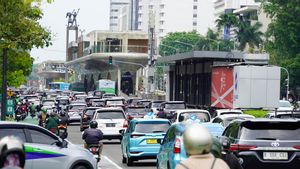JAKARTA - After falling down a ladder, this proverb may be suitable to describe the condition of the cinema industry in Indonesia. Cinema entrepreneurs can only surrender, because they are not only pressured by the COVID-19 pandemic, large-scale social restrictions (PSBB) have also made it difficult for this industry to survive.
Not to mention, the existence of a new regulation by the DKI Jakarta Provincial Government regarding the reduction of film viewing hours during the Christmas and Year holidays has made entrepreneurs even more depressed. In fact, this moment is an opportunity that the industry can take advantage of to reap bigger profits than ordinary days.
As is known, the Governor of DKI Jakarta Anies Baswedan imposed a new regulation on the deadline for film screenings in theaters at 19.00 WIB during the Christmas and New Year 2021 holidays.
Chairman of GPBSI, Djonny Syafruddin, said that with the implementation of the new regulation on film viewing limits, it would reduce turnover. Moreover, the cinema has not yet recovered. In fact, during the implementation of the PSBB, the number of visitors at most was only 15 percent.
Moreover, said Djonny, there were also no films shown. Western films have also been postponed until March 2021. However, the screening of Wonder Woman has made the number of visits increased. But not significant.
"Wow, if we count a lot. I'm not ethical to mention numbers, because in the face of a pandemic, how many months have we lost it will not be billions anymore, but trillions," he said, when contacted by VOI, in Jakarta, Thursday, December 17.
Djonny gave a simple calculation regarding the losses suffered by assuming that each cinema recorded revenue of IDR 1 billion per month, but due to the pandemic and the existence of PSBB, that income has dropped.
"So if the average revenue for each cinema is for example IDR1 billion, 400 times that's all, just imagine. That's per month. Trillions are the main thing (the loss)," he explained.
Cinema revenue is only Rp. 200 thousand per dayDuring the three months that it started its operation, said Djonny, the cinema he owned had only recorded an income of Rp. 200 thousand to Rp. 800 thousand per day. In fact, before the pandemic, income per day could reach Rp. 5 million to Rp. 20 million.

Djonny said that cinema entrepreneurs can only surrender that the final screening time of a film is limited to 19.00 WIB during the Christmas and New Year holidays. In fact, at this moment entrepreneurs can reap a bigger turnover than normal days.
"We average almost 30-40 percent of the average normal day, including the Eid al-Fitr. In the months there are only warnings. But, we obey (the rules), we must be united in this situation," he said.
[/ read_more]
For your information, the operating hours of cinemas in DKI Jakarta are limited during the Christmas and New Year holidays. DKI Jakarta Governor Anies Baswedan allows the last screening hour of cinema films to be at 19.00 WIB.
This provision is contained in Governor Instruction Number 64 of 2020 concerning Control of Community Activities in Prevention of COVID-19 during the Holidays of Christmas 2020 and New Year 2021.
This provision applies from 24 to 27 December 2020 and 31 December 2020 to 3 January 2021.

In addition to cinemas, Anies also regulates the operating hours of food stalls, restaurants, cafes, restaurants, and tourist places / areas during the Christmas and New Year holidays. They were ordered to impose operational hours limits no later than 21.00 WIB, but on certain dates only until 19.00 WIB.
Not enough income to pay for electricityThe cinema industry in Indonesia has gradually reopened itself. In fact, it's been running for three months.
However, his condition is still concerning due to the COVID-19 pandemic. Djonny Syafruddin said the cinema revenue was not enough to cover the cost of electricity usage.
"It's been 3 months since we opened, we only get Rp. 60 million a month. For film providers, Rp. 30 million. To cover electricity (costs) is not enough," he said.
Although currently the cinema industry is still in a slump, it is hoped that this business can recover soon. Of course, the vaccine also gives hope to them because it can restore public confidence in doing activities.
"If I count it from December, it is the fastest 8 months to recover if there are no urgent problems. We hope that it will take less than 8 months if the vaccination goes well, because it restores people's trust," he explained.
[/ read_more]
The English, Chinese, Japanese, Arabic, and French versions are automatically generated by the AI. So there may still be inaccuracies in translating, please always see Indonesian as our main language. (system supported by DigitalSiber.id)










